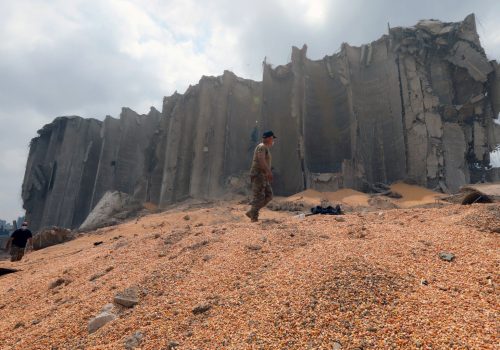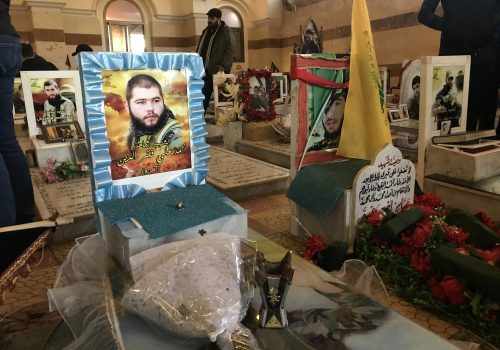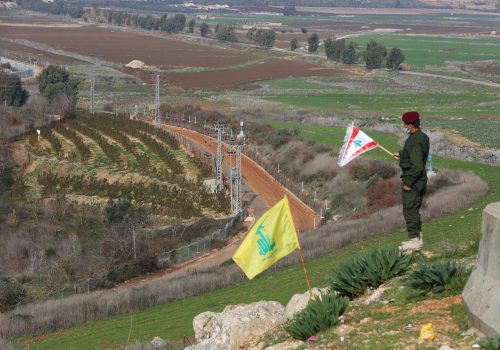Lebanon just had an election. Its result? Curb the optimism.
There’s little to celebrate about the outcome of Lebanon’s parliamentary elections on May 15. While the results demonstrate that an active minority are angry, the low voter turnout—41 percent—in an election billed as “decisive” for Lebanon’s future reveals that the country’s citizens are largely apathetic or disillusioned about the prospects of meaningful change. Indeed, the surprise victories of “independent” or so-called opposition candidates, the gains of the Christian nationalist Lebanese Forces party, and Hezbollah’s loss of a parliamentary majority with its allies are unlikely to help reverse the country’s economic downturn.
Lebanon desperately needs genuine economic reforms to even halt its ongoing collapse—not the largely cosmetic measures of the past meant to hold the country over between foreign aid handouts. Political reform is a necessary precondition to establishing a sustainable economy. Neither are more likely today than under the previous parliament.
The country’s traditional parties undermined Lebanon’s economy through decades of waste, corruption, and financial mismanagement. Rather than create productive sectors or improve the country’s infrastructure to attract sustained foreign investment, they bet on high-end tourism, banking, luxury real estate, foreign handouts, and expatriate remittances to keep the economy afloat. That approach benefited Lebanon’s feudalist warlords, ensuring that citizens continued to rely on them for their livelihoods. These leaders also bloated the bureaucracy and public sector, doling out jobs to their supporters to ensure their continued dependency and allegiance, even as this cronyism drained Lebanon’s economic vitality. These traditional parties, though battered for now, remain powerful enough to prevent the creation of a sustainable economic model that would further erode their influence.
Hezbollah will continue to align itself with the traditional parties to prevent reforms that could begin to meaningfully restructure the economy toward more stable and sustainable growth. The group is a symptom, rather than the root, of Lebanon’s many ailments, operating symbiotically with those problems. Hezbollah thrives off the same sectarianism, fractured national identity, and corruption that empower Lebanon’s other feudalist political forces. The group, therefore, uses its political, social, and military influence to prop up Lebanon’s corrupt political system and prevent the emergence of a strong state, functioning institutions, or a viable economy that would obviate the need for a sectarian militia.
The recent elections admittedly constitute a minor setback for Hezbollah. The group’s allies have lost their majority and Hezbollah’s absolute number of votes reveals a minor—but possibly temporary—loss of popularity among Lebanese Shia.
However, it’s important to remember that Hezbollah has never entrusted its fortunes, influence, or actions to the electorate. Even when the group and its allies were in the parliamentary minority between 2005 and 2018 and were facing a theoretically unified March 14 Alliance, Hezbollah retained its private arsenal, growing its domestic organizational apparatus, and embarking upon military adventures in Syria, Iraq, and Yemen without any regard for Lebanese public opinion or governmental approval.
Since late 2019, Lebanon’s ongoing collapse and instability, and Hezbollah’s reluctance to compound those miseries with war, have significantly constrained its actions against adversaries, particularly the Israelis. However, these are temporary limitations for Hezbollah, and haven’t brought it closer to disarmament. The group’s behavior vis-à-vis Israel won’t change because of the election results and the perpetual threat of war between them discourages significant foreign investment in Lebanon.
Moreover, accurately breaking down the parliamentary blocs paints a bleaker picture. Out of 128 parliamentary seats, the Hezbollah-aligned bloc can reliably count on fifty-eight seats, remaining parliament’s largest grouping. Arrayed against this bloc are the remnants of what were once the anti-Syrian March 14 Alliance, now a diminished and loose collection of parties. They can count thirty-three seats, but with less unity than their opponents. Only these members of parliament can reasonably be considered reliably anti-Hezbollah, but even they have compromised with the group and its allies in the past. The most glaring examples have been admitting Hezbollah to several “national unity” governments that have lacked a parliamentary majority, cabinet statements legitimizing Hezbollah’s private arsenal, and succumbing to the group’s pressure to elect Michel Aoun as president in 2016.
The mercurial Walid Jumblatt’s Progressive Socialist Party (PSP)—separately with eight seats—can be expected to cooperate with either side, depending on its interests. The remaining twenty-nine seats are divided between so-called “opposition” candidates (thirteen seats) and “independents,” who garnered sixteen seats. These parliamentarians—particularly the independents—cannot accurately be considered a block; they span the gamut of political views. Their policy prescriptions and voting pattern and alignment remain unpredictable.
Several factors discourage optimism that they will either consistently side against the Hezbollah-aligned bloc or for fundamental change. Lebanon’s sectarian political system heavily favors traditionalist parties over “opposition” candidates and “independents.” The country’s ongoing economic collapse will also force them and their “March 14” counterparts to pragmatically swallow a bitter pill: either work towards bland “consensus” objectives that will leave Lebanon’s root problems unremedied, or paralyze the country by picking a political fight with Hezbollah over its private arsenal, corrosion of the Lebanese state, and protection of Beirut’s corrupt political order.
It’s unlikely these non-traditional candidates will choose the latter option. Some have already indicated a likely representative willingness to work with or accommodate Hezbollah, reflecting the disunited and disorganized October 17 protest “movement’s” pragmatism in picking its battles with the group and their lack of consensus on undermining it.
The day after his electoral victory, Elias Jarade—an “independent” celebrated for his upset victory over long-time Hezbollah-ally Asaad Hardan—told Al-Manar that structural reforms would follow the liberation of a thin strip of land (presumably Shebaa Farms) currently controlled by Israel, but which Lebanon claims. Jarade also stressed the importance of protecting “the Resistance” and its accomplishments and honoring the sacrifice of its “martyrs.” Whatever Jarade’s personal beliefs regarding Israel or “resistance,” his statements suggest a willingness to establish a modus vivendi with Hezbollah, even though the group’s private arsenal and shadow state are deeply corrosive to Lebanon’s political and economic wellbeing. Yet another “independent,” Paula Yacoubian—a self-fashioned champion of the October 17, 2019 Lebanese protests—has said in the past that she has no interest in siding against Hezbollah or obeying what she described as American “inflammatory rhetoric” against the group.
Even as a hypothetical united bloc, the March 14, Progressive Socialist Party, and other opposition and independent MPs would lack the numbers necessary for decisions like electing a new president, which requires a two-thirds parliamentary majority. What’s likely is that either a candidate acceptable to Hezbollah will be appointed immediately, or that the group will paralyze the country until their opponents relent—repeating the process of Aoun’s election. Since the president—in consultation with parliament—appoints a prime minister, Hezbollah-aligned parties will be able to influence the composition of the cabinet, Lebanon’s executive body.
Hezbollah won’t be satisfied even with that. It will want to dictate the cabinet’s decision-making. Its leadership, including Secretary-General Hassan Nasrallah, has vowed to be part of any future Lebanese government, “whatever its composition.” The group’s parliamentary bloc head, Mohammad Raad, issued an ultimatum to the group’s political opponents: either admit Hezbollah to the government or “fuel civil war.” He added, “Be wary of being our enemies.” This suggests that Hezbollah intends to employ its old combination of carrot, stick, and paralysis tactics to re-enter the cabinet if it isn’t admitted willingly. The group did exactly that between 2006-2009, punctuating the political deadlock with an assault on Beirut in May 2008, forcing then-Prime Minister Fouad Siniora to admit them into a national unity government. By retaining this influence within the government, Hezbollah and its allies will be able to safeguard the futures and fortunes of the traditional political class, stalling significant remedies to either Lebanon’s economic or political problems.
Any enthusiasm over the outcome of Lebanon’s parliamentary elections must therefore be tempered by a sobering realization: the country still doesn’t have the conditions to implement the genuine reforms it so desperately needs. If anything, the outcome makes it more likely for Lebanon’s political pantheon to answer Nasrallah’s call to “temporarily” set aside the issue of the group’s arsenal and focus on economic recovery—but on Hezbollah’s terms. In other words, the most superficial of economic reforms will be possible. This could potentially re-open the spigots of foreign aid, allowing Beirut to return to a familiar pattern, hobbling along between handouts from the international community.
David Daoud is a nonresident fellow at the Atlantic Council. He is also the director of Lebanon, Israel, and Syria research at UANI. Follow him on Twitter: @DavidADaoud.
Further reading
Fri, Aug 7, 2020
Ammonium nitrate didn’t belong to Hezbollah, but they knew about its dangers
MENASource By
Hezbollah is acutely aware of the danger that such chemicals—even if not of a military grade—pose to nearby civilians, perhaps more so than any other entity in Lebanon.
Mon, Jul 20, 2020
Amidst the pandemic, Hezbollah buries fighters killed in Syria
MENASource By
Multiple additional combatant deaths have been reported by media outlets close to Hezbollah since the COVID-19 lockdown, pointing to its continued engagement in military combat and training activities.
Thu, Aug 12, 2021
Hezbollah walks tightrope between two opposing goals to deter Israel
MENASource By David Daoud
On August 5, an Israeli airstrike in south Lebanon—targeting an open area from which rockets had been launched at Israel by unidentified militants in the third such incident since May 19—prompted Hezbollah’s rocket attack.
Image: Public officials, who will take charge as pole clerks, cast their votes before the general elections to be held in 16 May Lebanon , Beirut on May 12, 2022. (Photo by Fadel Itani/NurPhoto)


